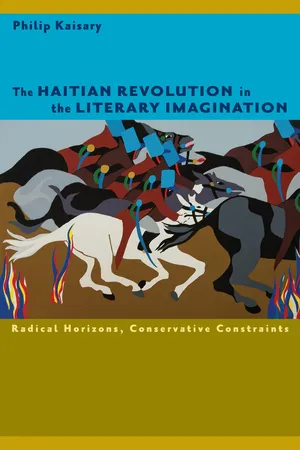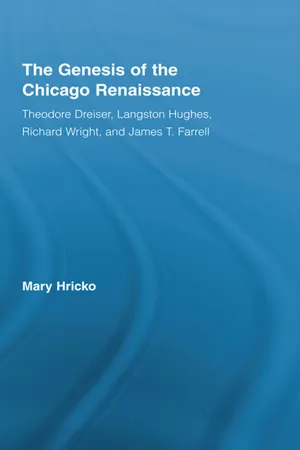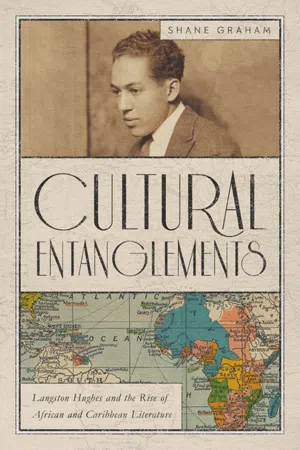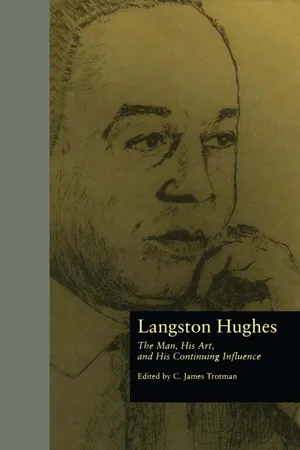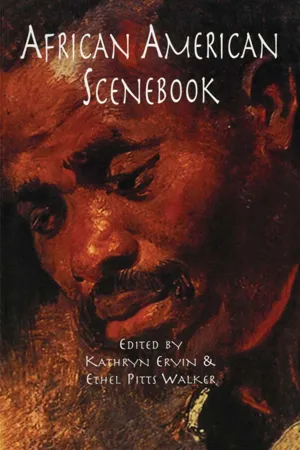History
Langston Hughes
Langston Hughes was a prominent figure of the Harlem Renaissance, a cultural movement that took place in the 1920s and 1930s. He was a poet, novelist, and playwright known for his insightful portrayals of African American life and culture. Hughes' work often addressed issues of identity, discrimination, and the pursuit of the American Dream, making him a significant voice in American literature.
Written by Perlego with AI-assistance
Related key terms
5 Key excerpts on "Langston Hughes"
- eBook - ePub
The Haitian Revolution in the Literary Imagination
Radical Horizons, Conservative Constraints
- Philip Kaisary(Author)
- 2014(Publication Date)
- University of Virginia Press(Publisher)
2. Langston Hughes: Harlem and HaitiI had read of Toussaint L’Ouverture, Dessalines, King Christophe, proud black names, symbols of a dream—freedom—building a citadel to guard that freedom.—Langston Hughes, I Wonder as I WanderThe influence of the Harlem Renaissance on both Aimé Césaire and C. L. R. James was fundamental. Langston Hughes and other poets and writers of the Harlem Renaissance, including Claude McKay, Jean Toomer, and Countee Cullen, “enjoyed a heroic status among black intellectuals when Césaire arrived in Paris in 1931.”1 Hughes was dubbed “the father of negritude,”2 his work known to and admired by writers adhering to its agenda as well as C. L. R James.3It is thus instructive to turn to Langston Hughes’s recuperations of the Haitian Revolution and to trace their commonalities with Césaire’s and James’s radical anticolonial projects. Langston Hughes has long commanded an iconic status in the history of African American letters, and viewing him in the company of Aimé Césaire and C. L. R. James, as one part of a global triptych of radical black anticolonial intellectuals, is a productive critical perspective, and one that departs from the discourse of celebration now surrounding Hughes’s legacy. Here there has emerged a cult of personality that has made it possible to discuss and portray Hughes and his work in highly decontextualized terms, divorcing Hughes’s work from its original political and historical location.Isaac Julien’s 1987 film Looking for Langston is an eminent example of this approach.4 This presents us with a reduced portrait of Hughes which foregrounds his sexuality and occludes his politics. In stunning visual monochrome, complemented by an emotive sound track that ranges from impressionistic jazz to early house music, Looking for Langston constructs Hughes as a black gay icon, playing associations and stereotypes of blackness and homosexuality off against each other. But by essentializing Hughes as black and gay, and by giving a very limited space to Hughes’s writings, the film offers only an impoverished representation of Hughes’s life and significance, obfuscating many of the reasons for his status as the most creative and original writer of the Harlem Renaissance.5 - eBook - ePub
The Genesis of the Chicago Renaissance
Theodore Dreiser, Langston Hughes, Richard Wright, and James T. Farrell
- Mary Hricko(Author)
- 2013(Publication Date)
- Routledge(Publisher)
Saturday Review , Hughes explained why he thought he had been considered this type of writer: “I have often been termed a propaganda or protest writer. That designation has probably grown out of the fact that I write about what I know best and being a Negro in this country is tied up with difficulties that cause me to protest” (Hughes, Gibson Interview 63). Although Hughes saw the merit in writing that reflected a social political consciousness, he still believed that politics and literature did not always correlate:I did not believe political directives could be successfully applied to creative writing. They might well apply to the preparation of tracts and pamphlets but not to poetry and fiction—which to be valid, I felt had to express so truthfully as possible the individual emotion and reactions of the writer rather than the mass directives issued to achieve practical and often temporary objectives. (Hughes, I Wonder as I Wander 122)Unfortunately, Langston Hughes's social-political writings have often been considered an aberration in his literary career. Historically, critics reviewing these works declare little value, if any, to the inclusion of the works in Hughes's canon. Even now, despite re-examination of the merit of these writings within their context, there are still many scholars who disregard these works in lieu of Hughes's more politically correct pieces. One reason some critics ignore Langston Hughes's radical material is that Hughes, himself often repudiated these writings as past mistake and on several occasions fervently denied supporting any radical ideologies. Yet, if we examine the historical context in which Hughes's denials were made as well as his development as a writer, we can see that Hughes was often forced to make literary concessions that contradicted his true beliefs. To be considered a black radical in a white dominated conservative society would not have been profi table for an African American writer who lived entirely on his professional earnings from his literary activities. Throughout his career, Hughes did what he could to disassociate himself from radicals when such relationships threatened his financial security. It was a situation he had often regretted, but he had come too far to forfeit his literary reputation. Yet, despite Hughes’ reluctance to pledge allegiance to any radical organization, he still felt an obligation to support Leftist movements that were organized to promote important social causes. In a 1960 interview, Hughes explained that he had “believed in the entire philosophies of the Left at one period in [his] life, including Socialism, Communism, and Trotskyism—[for] all isms have influenced [him] in one way or another,” but for the most part, he basically considered himself “apolitical” (Richard Gibson 16). It was this attitude that often put Hughes in conflict with Wright. Some literary critics believe that Hughes was wary of Wright's more radical ideals and often challenged the younger writer's embrace of such ideology. - eBook - ePub
Cultural Entanglements
Langston Hughes and the Rise of African and Caribbean Literature
- Shane Graham(Author)
- 2020(Publication Date)
- University of Virginia Press(Publisher)
His earliest poems take their themes from his native Jamaica, and many of them are written in Jamaican vernacular dialect, making him an important figure in the history of Caribbean literature. But he left Jamaica for the United States in 1912 at the age of twenty-two and would never again live in the West Indies or write poetry in the Jamaican patois. Partly by virtue of his association with the Harlem Renaissance and the inclusion of his writing in such important anthologies as Alain Locke’s The New Negro, Langston Hughes and Arna Bontemps’s The Poetry of the Negro, and David Levering Lewis’s Harlem Renaissance Reader, McKay is often counted as an honorary African American. But he spent most of the crucial years of the Harlem Renaissance (roughly 1917–29) living not in Harlem but in England, Russia, southern Europe, and northern Africa. The most profound precedent that McKay set for the younger Hughes, I maintain, was an aesthetic deeply planted both in politics and in the soil of ordinary people’s cultural life. Hughes drew vernacular influences from Whitman, Sandburg, and Dunbar as well, but McKay’s brand of proletarian art had a demanding political urgency to it that appealed to Hughes the radical sloganeer who would emerge in the 1930s. The defiant political stance McKay took or implied in his writings might well have emerged from his admiration for Russian literature and his engagement with Soviet society, which, as Kate Baldwin notes, “produced theories about using culture not only as a tool of internationalism but also interracialism.” 19 Wayne Cooper, in one of his section introductions in The Passion of Claude McKay, argues that McKay had a vision of black identity very different from the elitism of Du Bois’s belief in the “talented tenth”: “McKay pushed forward in his novels and stories the ignorant black folk of farm and city as the potential directors of their own fate - eBook - ePub
Langston Hughes
The Man, His Art, and His Continuing Influence
- C. James Trotman(Author)
- 2014(Publication Date)
- Routledge(Publisher)
The Langston Hughes Society was founded in 1981 and lists hundreds of members. The Langston Hughes Review remains in publication ten years after its founding. These many bits of evidence reveal that writing seriously about African American people proved successful for Hughes. Moreover, Hughes's success has taught subsequent generations of writers valuable lessons about universality. While we once associated broad human values which were not limited to one place or to one period of time only to such classics as Shakespeare's Romeo and Juliet or Jane Austen's Pride and Prejudice, we can now trace both critical and popular appraisals of the Simple tales and find the same praise being offered to Langston Hughes's portrayal of this Everyman from Harlem. By reviewing the kinds of authorial, aesthetic, and critical decisions which led to Hughes's creation of Simple, contemporary readers can see how similar declarations and choices have arisen from other critics and African American writers. Furthermore, readers can note the scholarly and popular evidence that Simple has indeed remained vibrant and believable beyond both his era and his geographical and political boundaries. First of all, while Langston Hughes had already become firmly established as a writer by 1943 when he introduced the Simple episodes as occasional features in his weekly column in the Chicago Defender, that venue provided Hughes's first regular access to an almost entirely African American audience, not of the priviledged and elite but of average people. Thus, while Hughes had needed to consider the broader American reading public with his short stories for the Saturday Evening Post or for his earlier collections of short stories such as The Ways of White Folks, by 1942 when he began his “Here to Yonder” column in the Defender, he could address a black audience every week. He could use the language—even the slang—of the black readers of the Negro press - eBook - ePub
- Ethel Pitts-Walker, Kathryn Ervin, Kathryn Ervin, Ethel P. Walker(Authors)
- 2014(Publication Date)
- Routledge(Publisher)
Histories Don’t You Want to Be Free? From Slavery through the Blues to Now—and Then Some! With Singing, Music, and Dancing Langston Hughes INTRODUCTION Langston Hughes, the quintessential African American literary figure, stands as a giant among his peers. His writing career spans forty years and includes genres of poetry, prose, and dramatic literature. Although a Missourian by birth, Hughes adopted Harlem as his home and the people of Harlem set the rhythms and styles for his writings. His brief tenure with the Harlem Suitcase Theatre in 1937 led to the production of Don’t You Want to Be Free ? He came to know and appreciate the diverse characters he met on the streets, in the churches, in the bars, and in homes of the uptown New Yorkers, and his ability to capture their dreams, despair, frustrations, anger, and hopes translated into recognizable speeches and dialogue. Hughes’ early poem, “The Negro Speaks of Rivers,” is a prelude to Don’t You Want To Be Free ? as he chronicles the African American’s journey from Africa to the Americas and the multiplicity of roles African Americans had to play in the New World. Although written in 1937, the script continues to ring true for 1997 audiences as well. Combining music, dance, and poetry, Hughes carries his audience through an odyssey of African American history. The spirituals and blues heighten the events which move from the African shores before the middle passage to the streets of 1937 Harlem. Not only does the play present the horrors of slavery, it also shows the pride and love of life that enables a people to survive. There is humor and pain as the freedmen migrate from the segregated South to the isolated ghettos of the North. The Depression of the 1930s affected Blacks and Whites, and Hughes ends the play with a rallying cry for the working class to unite for a better America. As the audience joins in the final song, the play ends on an upbeat and positive note
Learn about this page
Index pages curate the most relevant extracts from our library of academic textbooks. They’ve been created using an in-house natural language model (NLM), each adding context and meaning to key research topics.
